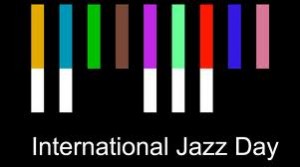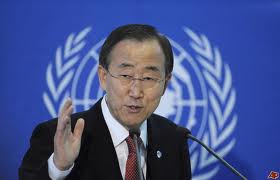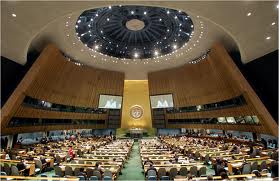Read my short-hand review, please, in CityArts-New York of the sunset concert of International
 Jazz Day in the General Assembly of the UN in New York City. The music of Louis Armstrong, Duke Ellington, Miles Davis, Thelonious Monk, John Coltrane, Billie Holiday, Howlin’ Wolf , Leonard Bernstein and many more was manifest by all-stars of all ages (Esperanza Spalding, 28, to Candido Camero, 91), many ethnic backgrounds and aesthetic leanings (Chaka Khan, say, to Zakir Hussain).
Jazz Day in the General Assembly of the UN in New York City. The music of Louis Armstrong, Duke Ellington, Miles Davis, Thelonious Monk, John Coltrane, Billie Holiday, Howlin’ Wolf , Leonard Bernstein and many more was manifest by all-stars of all ages (Esperanza Spalding, 28, to Candido Camero, 91), many ethnic backgrounds and aesthetic leanings (Chaka Khan, say, to Zakir Hussain).
This first International Jazz Day — April 30 2012 — was a phenomenal world-wide event, initiated by composer-pianist Herbie Hancock and reaching at the very least the 195 nations that had musicians playing Hancock’s “Watermelon Man” in tandem with his own performance of it at a sunrise concert in Congo Square, New Orleans. The sunset concert in the hallowed and vast
main hall of the UN was an impressively strong demonstration of jazz’s vitality and diversity, too. Videos of both entire shows as live-streamed (but poorly indexed) are now archived at the website of the Thelonious Monk Institute of Jazz, which co-sponsored the initiative with UNESCO.
It was amazing and for jazz devotees enormously heartening to watch the Secretary General of
the UN Ban Ki-moon on giant tv screens hung on the front wall of the General Assembly mention that “the UN flag is, after all, kind of blue,” and that he was “in the mood” to “sing sing sing,” thanking those of “take the A-train” to attend an event celebrating music that takes us from “April in Paris to autumn in New York, from a night in tunisia to Ipanema, and Birdland.”
It was inspiring to hear U.S. permanent representative to the UN Susan Rice say, “The origins and early developments of jazz are quintessentially American . . .Like democracy itself, jazz has structure, but within it you can say almost anything. . . . Now jazz is everyone’s music.” And she quoted Charlie Parker — “If you haven’t lived it, it can’t come out of your horn.” (Can you imagine George W. Bush’s UN ambassador John Bolton saying such things? Can you imagine these words being spoken on the floor of the U.S. Senate or House of Representatives? WHY NOT?)
It was incredible but so beautiful it brought tears to my hard old eyes to hear UNESCO General Director Irina Bokova say that although there is much disagreement and mystery about the origins of the term for our music , “to UNESCO, ‘jazz’ is another word for ‘life’.”
News of the first International Jazz Day events — held in Paris, New Orleans, New York City at the United Nations, some 200 nations in all — ought to be reverberating throughout jazz and other musics’ sites on the internet, but only the AP article, evidently crafted from contributions by music writer Nekesa Mumbi Moody, is besides mine an eyewitness account posted anywhere, so far.
JazzTimes has an advance article  DownBeat doesn’t mention International Jazz Day on its website at all. AllAboutJazz has re-posted R.J. DeLuke‘s blog article, buried in the “news” section under stories about bluesman Sonny Landreth performing and teaching at a festival next August, the Maryland Summer Jazz Festival next July, and an interview with organist Richard “Groove” Holmes (1931-1991, here named “Jazz Musician of the Day”). A Blog Supreme, usually dependable for relevant reports, also has only an advance article (but a nice picture of the UN General Assembly from Getty Images, which I can’t use here).
According to a jazz wife who gets her information first-hand, Herbie Hancock, appointed last year as a UNESCO cultural ambassador, had been walking around the rehearsals saying the U.S. has blown its chance to promote jazz as our own major, enduring contribution to humanity’s
artistic heritage, but fortunately UNESCO has stepped up to embrace jazz for everyone the world-over. Whatever the reason the U.S. is so reluctant to support its artists and acknowledge other-than-commerical or classical arts, our nation has indeed created something in jazz to be proud of.
As UNESCO’s Ms. Bokova, who is Bulgarian, said in her remarks, “Jazz is the music that makes the most of the humanity’s diversity, that crosses all borders and brings people together. Jazz is not something that you only hear, it is something you feel deep inside that bursts forth in joyous expression. There is hardly a better school of sharing and cultural dialog.”
What a joy for those of us who have harbored that idea privately, perhaps thinking we must be delusional or sorely mistaken, to have the unique communicative powers of jazz certified from the podium of the one organization which, for all its flaws, attempts to oversee what’s happening on earth. Jazz is, evidently, a significant enough aspect of all peoples’ activities to rate one day a year out of 365 in its honor. Celebrating by playing it and listening to it globally, jazz people are trying to give back, and keep it going.



